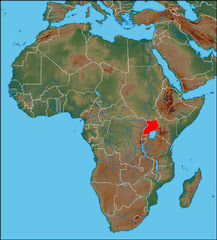The rioting in Kenya over a fraudulent election outcome has resulted in many deaths. It has also affected Uganda and other landlocked countries since petrol and other goods are imported
from or through Kenya.
http://allafrica.com/stories/200801020014.htmlhttp://tinyurl.com/398werPetrol in our area of Uganda has doubled and even tripled in some areas. Danny and I left our holiday accommodation this morning and noticed price changes at garages going from appoximately 2,600sh to 6,000 and 8,000sh. The roads were nearly devoid of traffic. No one can afford to pay that amount and the taxis, matatus (minibus taxis) and bodas (motorbike taxis) have tripled their fares. We saw few of them on the road.
We are safe where we are as all the rioting is in Kenya near the border with Eastern Uganda -- we are in the SW. If this continues the cost of transporting goods will dramatically increase and affect the price of all goods.
A couple of notes....Anyone can sign up to get my blog updates via email. See the box in the sidebar and simply add your email address. Confirm it by replying to the email you will be sent.
I will be adding my accommodation review with the requested 'candid guest photos' to Tripadvisor during the next week or so. I will post the link to the blog.







